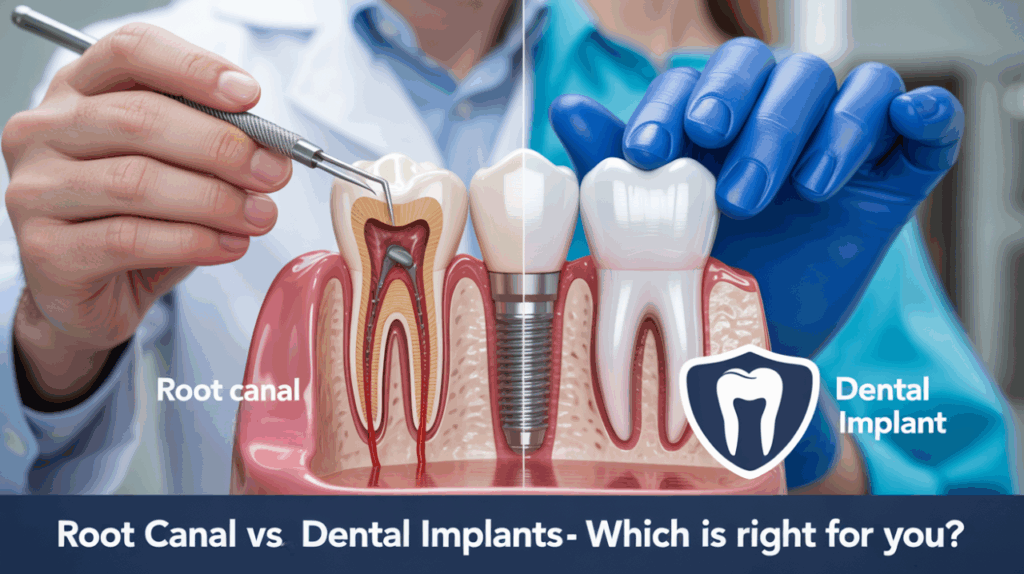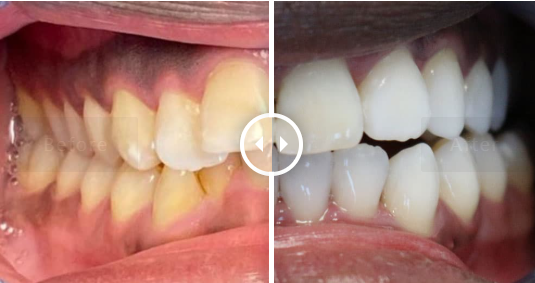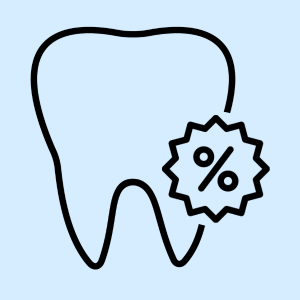
When a tooth hurts or sustains an injury, it can feel stressful trying to decide the right course of treatment. Should you try to preserve it, or is replacing it the better option? For many patients, the decision often comes down to a root canal or a dental implant.
This guide explains both treatments, when a root canal may be enough to keep your natural tooth, and when a dental implant might be the healthier, longer-term choice.
What Is a Root Canal?
A root canal is a treatment designed to preserve your natural tooth. Each tooth has a soft center called the pulp, which contains nerves and blood vessels. If the pulp becomes infected or damaged due to deep cavities, cracks, or injury, a root canal may be recommended.
Here’s how the process typically works:
- Local anesthesia is given to keep you comfortable.
- The infected pulp is carefully removed.
- The inside of the tooth is cleaned and sealed.
- A crown or filling is placed for protection.
With proper care, a root canal allows you to maintain your natural tooth structure and function.
If you’re uncertain whether a root canal can save your tooth, consider scheduling a dental exam to explore your options.
Disclaimer: Root canal treatments and dental implants are provided by skilled professionals at URBN Dental. A consultation with a dentist is necessary to evaluate your condition and decide on the right treatment.
When a Root Canal May Be Enough?
In many cases, a root canal can help save a tooth. Your dentist may recommend it if:
- The tooth structure is still strong enough to support a crown.
- The infection has not spread beyond the tooth’s root.
- Preserving your natural tooth is possible and preferable.
Root canals may be less invasive than implants, with a typically shorter recovery time.
Important: Only a dentist can confirm whether a root canal is appropriate after an in-person exam.
If you’re experiencing sensitivity, swelling, or tooth pain, consider seeing our dentist promptly to explore whether a root canal may help.
What Are Dental Implants?
Unlike root canals, a dental implant doesn’t save the natural tooth; it replaces it. A small titanium post is placed in the jawbone to act like a tooth root. After the bone heals around it, a crown is attached, restoring both function and appearance.
Implants can replace a single tooth, multiple teeth, or help stabilize dentures. They usually take longer than root canals because of the healing period, but they are generally considered a long-term solution..
If you’ve lost a tooth or been told one cannot be saved, talk to our dentist about whether an implant may be an option for you.
TOOTH TOO DAMAGED TO SAVE?
When to Think About Dental Implants?
Sometimes, saving the tooth isn’t possible, and an implant may be the better choice. Situations include:
- Severe cracks or fractures in the tooth.
- An extensive decay or infection that cannot be treated with a root canal.
- Repeated infections after prior root canal therapy.
- The tooth has a weak structure that cannot support a crown.
While implants involve a surgical procedure and healing phase, they provide a stable, lasting way to replace a missing tooth and maintain proper bite alignment.
If your dentist has recommended extraction, consider discussing whether a dental implant may be a suitable long-term solution.
Comparing Root Canals and Implants
Here’s a simple way to look at it:
- A root canal saves your tooth.
- An implant replaces your tooth.
Root canals usually take one or two visits, while implants require a healing period before the final crown is placed. Root canals are typically less expensive upfront, but implants can last decades with proper care. Both options, when done correctly, can help you chew, smile, and live comfortably. It is important to note that a dentist will need to examine your case in person to recommend the right treatment plan.
During your dental consultation, ask your provider to explain the pros and cons of each option for your specific case.
Handling Dental Emergencies
Tooth pain can occur suddenly, and if you experience severe pain or swelling, it’s important to seek professional care as soon as possible. Searching for a “dentist emergency near me” can connect you quickly with someone who can assess your tooth. In many cases, catching the issue early means a root canal can save it. Wait too long, and extraction followed by an implant may become the only choice.
NEED EMERGENCY CARE NOW?
Life After Treatment
No matter what treatment you undergo, post-treatment care matters a lot. After a root canal, a crown to protect the tooth and good oral hygiene will help it last for many years. With an implant, brushing and flossing, and keeping the gums healthy will protect the bone supporting the implant. Both require the same daily maintenance:
Both require the same daily habits:
- Brushing twice a day.
- Flossing daily.
- Visit your dentist for regular checkups and cleanings
The right treatment, along with good oral hygiene habits, will help maintain your strong and healthy smile for a long time.
Note: Please consult with your dentist for personalized post-treatment care instructions based on your specific needs.
Final Words
If you’re in pain or unsure whether your tooth can be saved, the first step is to get a professional opinion. Searching for a root canal near me will help you find urgent care when you need it most. And if you’re considering dental implants, our dentist in Spring Branch at URBN Dental can walk you through your options.
READY TO PROTECT YOUR SMILE?
Frequently Asked Questions
Only a dentist can decide after an in-person exam. In many cases, a root canal can save your natural tooth if the damage is limited. If the tooth is severely cracked, decayed, or can’t be restored, a dental implant may be the healthier option.
Both treatments can last for years with proper care and maintenance. Follow proper oral hygiene habits and schedule regular dental appointments.
Don’t wait until the pain worsens. Start by booking an exam. Searching online for our “emergency dentist near me” will connect you with a professional who can assess your tooth. If the tooth can’t be saved, your dentist will explain how a dental implant could restore your smile.
URBN Dental Services in Houston, TX
Houston | Katy | Montrose | West University Place | Greater Third Ward | Greater East End | North East Houston | Houston Heights | Central Northwest | Fairbanks | Acres Home | East Houston | Southeast Houston | Central Southwest | Fort Bend Houston | Brays Oaks | Meyerland Area | Sharpstown | Alief | Westchase | Memorial | Northwest Houston | Katyland | Whispering Lakes | Pine Lakes | Woodcreek Reserve



















